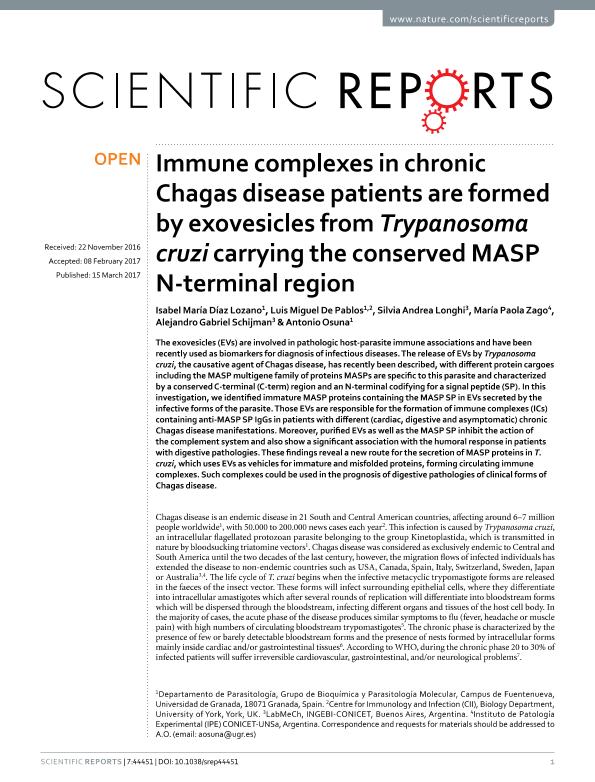Mostrar el registro sencillo del ítem
dc.contributor.author
Díaz Lozano, Isabel María
dc.contributor.author
De Pablos, Luis Miguel
dc.contributor.author
Longhi, Silvia Andrea

dc.contributor.author
Zago, María Paola

dc.contributor.author
Schijman, Alejandro Gabriel

dc.contributor.author
Osuna, Antonio
dc.date.available
2018-02-16T20:16:37Z
dc.date.issued
2017-03
dc.identifier.citation
Díaz Lozano, Isabel María; De Pablos, Luis Miguel; Longhi, Silvia Andrea; Zago, María Paola; Schijman, Alejandro Gabriel; et al.; Immune complexes in chronic Chagas disease patients are formed by exovesicles from Trypanosoma cruzi carrying the conserved MASP N-terminal region; Nature Publishing Group; Scientific Reports; 7; 3-2017
dc.identifier.issn
2045-2322
dc.identifier.uri
http://hdl.handle.net/11336/36665
dc.description.abstract
The exovesicles (EVs) are involved in pathologic host-parasite immune associations and have been recently used as biomarkers for diagnosis of infectious diseases. The release of EVs by Trypanosoma cruzi, the causative agent of Chagas disease, has recently been described, with different protein cargoes including the MASP multigene family of proteins MASPs are specific to this parasite and characterized by a conserved C-terminal (C-term) region and an N-terminal codifying for a signal peptide (SP). In this investigation, we identified immature MASP proteins containing the MASP SP in EVs secreted by the infective forms of the parasite. Those EVs are responsible for the formation of immune complexes (ICs) containing anti-MASP SP IgGs in patients with different (cardiac, digestive and asymptomatic) chronic Chagas disease manifestations. Moreover, purified EVs as well as the MASP SP inhibit the action of the complement system and also show a significant association with the humoral response in patients with digestive pathologies. These findings reveal a new route for the secretion of MASP proteins in T. cruzi, which uses EVs as vehicles for immature and misfolded proteins, forming circulating immune complexes. Such complexes could be used in the prognosis of digestive pathologies of clinical forms of Chagas disease.
dc.format
application/pdf
dc.language.iso
eng
dc.publisher
Nature Publishing Group
dc.rights
info:eu-repo/semantics/openAccess
dc.rights.uri
https://creativecommons.org/licenses/by-nc-sa/2.5/ar/
dc.subject
Trypanosoma Cruzi
dc.subject
Exovesicles
dc.subject
Masp
dc.subject.classification
Biología Celular, Microbiología

dc.subject.classification
Ciencias Biológicas

dc.subject.classification
CIENCIAS NATURALES Y EXACTAS

dc.subject.classification
Parasitología

dc.subject.classification
Ciencias de la Salud

dc.subject.classification
CIENCIAS MÉDICAS Y DE LA SALUD

dc.title
Immune complexes in chronic Chagas disease patients are formed by exovesicles from Trypanosoma cruzi carrying the conserved MASP N-terminal region
dc.type
info:eu-repo/semantics/article
dc.type
info:ar-repo/semantics/artículo
dc.type
info:eu-repo/semantics/publishedVersion
dc.date.updated
2017-11-03T19:09:48Z
dc.journal.volume
7
dc.journal.pais
Reino Unido

dc.journal.ciudad
Londres
dc.description.fil
Fil: Díaz Lozano, Isabel María. Universidad de Granada; España
dc.description.fil
Fil: De Pablos, Luis Miguel. Universidad de Granada; España. University Of York;
dc.description.fil
Fil: Longhi, Silvia Andrea. Universidad de Buenos Aires; Argentina. Consejo Nacional de Investigaciones Científicas y Técnicas. Instituto de Investigaciones en Ingeniería Genética y Biología Molecular "Dr. Héctor N. Torres"; Argentina
dc.description.fil
Fil: Zago, María Paola. Consejo Nacional de Investigaciones Científicas y Técnicas. Centro Científico Tecnológico Conicet - Salta. Instituto de Patología Experimental. Universidad Nacional de Salta. Facultad de Ciencias de la Salud. Instituto de Patología Experimental; Argentina
dc.description.fil
Fil: Schijman, Alejandro Gabriel. Consejo Nacional de Investigaciones Científicas y Técnicas. Instituto de Investigaciones en Ingeniería Genética y Biología Molecular "Dr. Héctor N. Torres"; Argentina. Universidad de Buenos Aires; Argentina
dc.description.fil
Fil: Osuna, Antonio. Universidad de Granada; España
dc.journal.title
Scientific Reports
dc.relation.alternativeid
info:eu-repo/semantics/altIdentifier/doi/http://dx.doi.org/10.1038/srep44451
Archivos asociados
